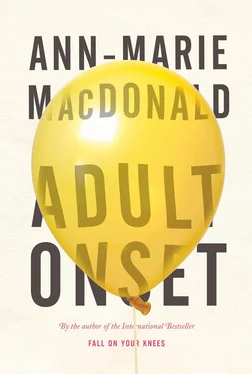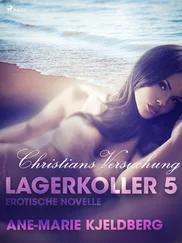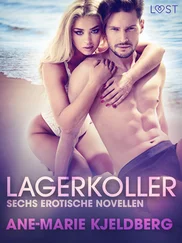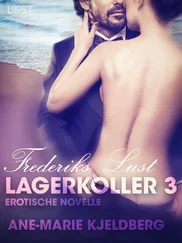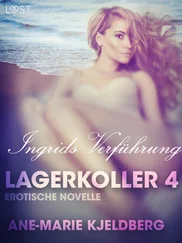They turned the page.
Mary Rose wrote another book. She got serious money for the first time, mortgage-torpedoing money. She and Hil married as soon as the law came in — they eloped, it was simpler — so while Dolly didn’t sing “My Best to You” at their wedding, when Matthew was born, along with the cheque from her and Dunc, Dolly sent them a card. On the cover was the Blessed Virgin Mary. Inside, it said, Prayer for a Wonderful Mother . Dolly had crossed out the a and added an s to Mother .
Maybe the crack in the Berlin Wall had been Dolly’s fear of losing her son, but she wasted no time tearing it down and driving west in a Lada. Or east in a VW … It was a miracle on the order of Our Lady of Lourdes. And Duncan followed. Or perhaps he was along for the ride in the back seat.
•
The hardest part of being in the hospital was having her father visit on his own on his way home from work.
“How’re you feelin’, sweetie pie?” He tossed his air force hat onto a hook near the door of the room she shared with Tracy-the-snowmobile-girl. “Have you had a bite to eat yet?”
She wished he would just go straight home. Now she would have to worry about him driving in the dark. It was February, five o’clock. “Not yet.”
The worry was an ache that echoed — spooned around — the physical pain: Dad’s new green Buick overturned on Days Road between the Kmart and the penitentiary. Just because there was a Dairy Queen on the corner didn’t mean you couldn’t die there.
“It’s a ten-minute drive, old buddy, I’ll be home before you know it.”
You could drown in a cup of water, five seconds was all you’d need in a car.
“I’m worried, Dad.”
“What are you worried about?” He gave her his incredulous grin. She saw his gold tooth.
She tried not to say it, but couldn’t help it this time. “What if you have an accident?”
“Are you kiddin’?” he said with a chuckle.
“No. I’m scared you’re going to have a car accident.”
She had never gone this far before, she felt like she was breaking a pact. Or revealing her true identity to both of them in a way that wasn’t very nice. But it felt involuntary, I have only a moment for this transmission, I am the real Mary Rose, and I am being held prisoner on the Planet —
“I won’t have an accident, Mister.”
“But what if you did?” And it slipped from her like something dark and dense, a lump of driftwood, charred from a long-ago campfire, “What if you died?”
He lowered his chin and regarded her from beneath hawk-like brows, mock stern. “There’s an old saying: ‘Don’t shake hands with the devil before you meet him.’ ”
She smiled, so he would believe he had reassured her.
Her supper came.
“Eat it all up now, it’ll put hair on your chest.”
Slice of turkey under sheen of gravy, ice cream scoop of mashed potato, triangle of mushy peas, individually sealed portion of applesauce, pebbled plastic cup of apple juice with a paper lid like a crinoline and bendy paper straw, some kind of cake thing. It all smelt like baby food. She glanced across at Tracy’s milkshake, sitting on her tray, beading condensation — she was asleep. Tracy could eat only milkshakes because she’d been on the back of her dad’s Ski-Doo when they went through a pasture fence at night.
Dad sat and read the paper while she ate, then she had to throw up right away.
She pushed aside the wheeled tray and begins carefully to lift her sheet and the openwork white blanket, all of it very clean and cardboardy.
“Where you goin’?”
“I have to throw up.”
He was hesitant. “Should I call the nurse?”
She walked slightly bent over, cradling the darkness on her left side.
Mum wasn’t here, she could rest when Mum was here — she was “in like Flynn” with the staff, Dad liked to say, indestructible. Her father was here on his own. Pale, fragile in his lovely uniform. Like a unicorn, too beloved to be durable. Breakable. She wished he would go home so she could know he was safe. “No, it’s okay,” she said.
It took a long time to walk across the room to the toilet, it was dizzying. There was a smell — Phisohex and rubbing alcohol, needles and fluorescent lights, white sheets. The smell of metal wheels and getting sliced open, so cold so cold so cold. She knelt at the porcelain — white dignity of the Virgin Mary.
Dad followed and stood behind her — she wanted to close the door but hadn’t managed it. She vomited, which was hard because it yanked the surgery, spasmed the streaky yellow, with each heave it seemed impossible to continue but less possible to stop — she’d had no idea how many muscles it took to throw up.
“Y’okay, sweetie?”
“Yup.”
The after-trembles were friendly, they shook her gently like a leaf, shook the slime from her lip, said, It’s over now . She brushed her teeth.
She felt him shadow her back to bed, a hovering presence in the shape of help, like a Guardian Angel, huge and beautiful but powerless. They loved you, but they couldn’t stop anything from happening to you. They worked for God.
She had forgotten about the gaping back of the hospital gown. She climbed onto the bed and it was sweet to lie back in the Javex sheets.
She said, “You can go home now.”
“I don’t have to go just yet.”
His light optimism was powerless here. Mum had power here — this labyrinth was her domain. Mary Rose felt bad about not showing him how reassured she was. She slept.
When she woke up, it was dark and he was gone.
•
Everything has been fine with her parents for over a decade now, but something is bothering her at the back of her mind … like one-eyed Detective Columbo, hesitating at the exit, she is aware of a blank spot. The bad time ended abruptly and everyone carried on as though nothing had happened — they turned the page. But lately she wonders if in fact they burned the book.
•
A few times, she had supper in the sunroom at the end of the hall with the other children on the ward. The big windows shone black with the February night. Here were no visitors and no grown-ups. Warm light was cast by reading lamps that squatted on mismatched end tables, a world away from fluorescent corridors and sterile hospital rooms. There were shabby easy chairs and worn toys; blocks with faded letters, a basket of old Lego, games of Chinese checkers and Monopoly — the money frayed with use. The smell was less clinical too, more a fug of flannel and crayons than Phisohex and isopropyl.
On each occasion, an inner circle of children had gathered as if the hospital were their home, and this was the playroom, where they could relax and toys might come alive at midnight. Some of the children had been admitted months before, while others were in and out on such a frequent basis they all knew one another. They were not a mean clique, however, they were more like a family with no parents. Stranded. Stoic. They were kind to one another, and they opened their circle to Mary Rose.
The leader was a girl who, though a year older, was smaller than Mary Rose and seemed like a grown-up. A nice one. She was round like a robust doll, with blue eyes and a mass of corn-coloured curls she wore in a frizzy ponytail like a pompom. Her blue sateen robe was belted snugly round her middle, she was cheerful, and she looked after the other children — one, named Norman, had “a nervous condition.” He was prone to seizures and walked leaning sideways, unblinking. Another was so lively it was hard to believe there was anything wrong with him — he wore hard shoes with his pyjamas and slid on the freshly waxed floor.
It was like being in an orphanage. It was alluring, and Mary Rose was dimly aware that she oughtn’t to allow the others to believe she was truly one of them. She needed to remember that she would be going home to her real life … she would not remain here in their dear dilapidated child’s realm. They were like a community of damaged toys. Friendly, fun, but take care lest they lull you into forgetting your life as a real child, hard as that life may be sometimes, tempting as it may be to stay in the land of lost toys …
Читать дальше
